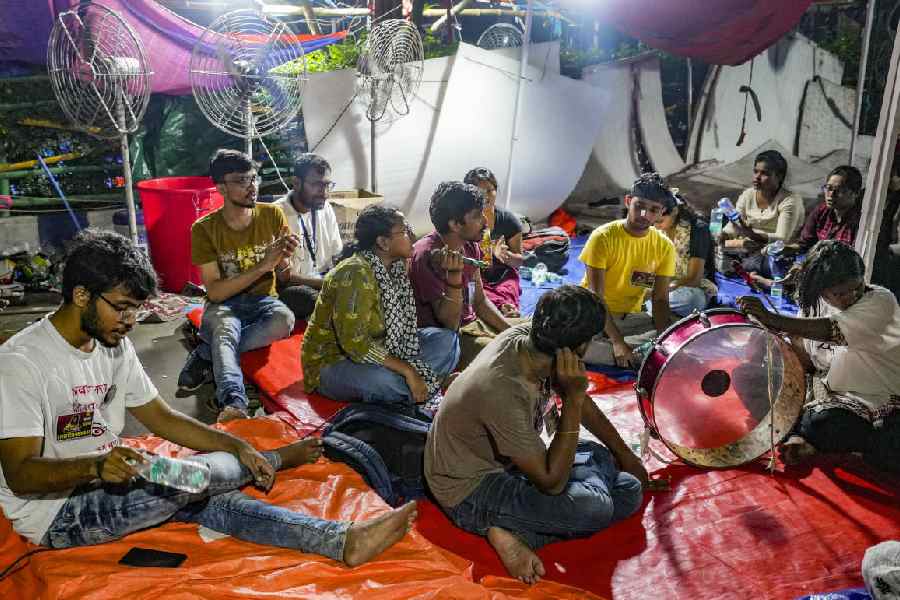Junior doctors across medical colleges in Bengal will return to a complete cease-work from Monday evening, withdrawing even from the essential services they had been providing.
These doctors had only resumed essential services on September 21 after a 42-day strike that took a heavy toll on the state’s health care delivery.
While threatening the resumption of the complete cease-work at 11pm on Saturday, the doctors also said they wanted to see what the state tells the Supreme Court about security measures in hospitals when the apex court hears the RG Kar case on Monday.
The cease-work will start after the court’s hearing is over.
A complete cease-work has already started at the College of Medicine and Sagore Dutta Hospital in Kamarhati on the city’s northern fringes from Friday night after some junior doctors were allegedly assaulted and threatened by irate relatives of a 36-year-old woman who passed away in the hospital. The complete cease-work at Sagore Dutta will continue, the junior doctors said.
“We are giving an ultimatum to the state government till 30th. Why are we announcing the resumption of the complete cease-work from Monday? Because we want to give a last chance to the state government. We want to see what the state produces before the Supreme Court. The CJI had asked (the government) to create confidence among junior doctors,” said Debashis Halder, a junior doctor, after a general body meeting with junior doctors from various medical colleges that went on for about five hours.
Halder said they wanted to see what steps the government has taken regarding demands 4 and 5 out of the five-point demands of junior doctors. Demand 4 was about improving the safety and security in medical colleges and hospitals. Demand 5 was about ending the so-called “threat culture” in medical colleges.
The doctors also announced a slew of processions on October 1 and 2 “with lakhs of people”.
“After the meeting with the chief minister and the chief secretary, we felt the state will show positive intent. But we saw that all of them (the assurances) are without any basis. We are not safe and secure in the medical colleges,” a junior doctor told the news conference on Saturday night.
Among the demands of the junior doctors are availability of on-duty rooms, washrooms, CCTVs, drinking water facilities adequate male and female police personnel. They also demanded a mechanism to display bed vacancy and a central referral system so that patients’ families do not have to run from one hospital to another to secure a bed.
A junior doctor at Sagore Dutta said the woman who died needed a critical care bed but the hospital did not have a vacant critical care bed when she came on Friday afternoon.
Speaking at Saturday’s news conference, Halder said: “The woman’s family would not have assaulted the doctors, nurses and other healthcare workers if they knew the bed status. We have demanded a central referral system from the state government.”
On September 21, the junior doctors resumed essential services like emergency and critical care. That strike, for 42 days, started following the rape and murder of a 31-year-old postgraduate trainee of RG Kar Medical College and Hospital on August 9.
Junior doctors from several medical colleges were huddled in a meeting from around 6pm to decide whether they should go back to a full cease-work. The decision was announced around 11.15pm.
The assault on Friday again revealed that there lay a wide gap between the state government’s assurances about beefing up security in the medical colleges and the ground reality, the junior doctors said.
Some of the familiar faces of the 42-day cease-work, Aniket Mahato, Kinjal Nanda and Asfakulla Naiya from RG Kar reached Sagore Dutta hospital on Saturday evening for the general body meeting with representatives from several medical colleges. “It is a basic right of people to be safe and secure. If a state administration fails to ensure something so basic, then there remains very little to say,” said a junior doctor.
The junior doctors met chief minister Mamata Banerjee on September 16 and among the demands put forth was improvement in the security measures in medical colleges and hospitals. The minutes of the meeting mentioned that the government had proposed a task force headed by the chief secretary that will also have representatives of junior doctors to look into issues of safety in hospitals.
The junior doctors met chief secretary Manoj Pant on September 18. The next day, Pant issued a set of directives to the state health secretary, which said on-duty rooms, washrooms, CCTVs, drinking water facilities should be ensured at the healthcare facilities. The directives mentioned that these works must be completed as early as possible.











